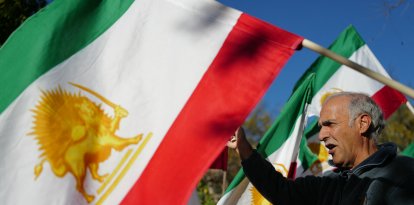Public neutrality about Hamas and Israel is complicity
Yes, we do have a right to be judgmental about those who share their views on social media on all sorts of issues, yet suddenly don’t have an opinion about the mass slaughter of Jews.

Israeli soldiers remove bodies after the October 7 attacks in Israel. (Cordon Press)
It’s terribly unfair. That’s the way some liberal Americans, especially some prominent Jews, are characterizing the criticism that they and others are getting for not being willing to publicly discuss their opinion about the Oct. 7 terrorist attacks on Israel perpetrated by Hamas—the largest mass slaughter of Jews since the Holocaust. The terror organization’s assault on Gaza border communities left 1,400 men, women and children dead with whole families murdered, as well as thousands wounded, and as many as 150 kidnapped and dragged across the border into Gaza. But as far as many prominent people are concerned, those numbers—not to mention the evidence found of horrifying crimes committed by the terrorists against their victims, including torture, rape and the desecration of corpses—is not enough reason for them to stick out their necks and identify themselves with the cause of Israel.
That’s been a shock to some in the Jewish community. They wonder why a historic event that has shaken them to their very core is something a lot of people have been so silent about. Along with the graphic pictures and videos of the horror inflicted by Hamas terrorists—some of which they posted themselves as they boasted of their crimes—this silence from a great many people, including some whose every opinion and move is chronicled on their own carefully curated social-media pages, is giving a lot of us a wake-up call about the world in which we live.
An ominous silence
For those who feel connected to Israel or simply believe that a crime of this magnitude demands both sympathy and robust support for efforts to end this terrorist scourge, the response to the Hamas atrocities has been intense and passionate. But the contrast between the broken hearts of those who care about Israel and the indifference of others—and that means many of the rich, talented or famous with large social-media followings—is staggering. It’s led some to conclude that, perhaps for the first time, they finally understand how the Holocaust happened. And that has caused them to draw some angry and negative conclusions about those who have remained ominously quiet.
One person who went public with her resentment about such conclusions is Democratic pollster and New York Times contributing columnist Elizabeth Spiers. In a column titled, "I Don’t Have to Post My Outrage. Neither Do You," she whined about the way she’s been attacked on X (Twitter) for not stating her opinion about the crimes of Hamas.
She started by explaining that she was "neither Jewish nor Palestinian" and that her regular beat was not foreign policy. Spiers then accounted for her initial silence about last week’s attack by noting that was dealing with a case of shingles and an ongoing battle with depression. If she had left it at that, no one would have criticized her.
But she went on to declare that the whole idea that decent people have to express an opinion about random bad things that make the news is wrong. She also believes that the impulse to post opinions in this manner leads to simplistic statements that reduce everything to a binary choice when so much in life is complex and ought to be discussed with nuance rather than a rush to issue a 280-character broadside.
How social media operates
If you know nothing about Internet culture, that might sound reasonable. Spiers has 81,900 followers on X (formerly Twitter), which gives her a decent platform for her views but one that is not comparable to the real heavy-hitter opinion leaders on that platform or the celebrities who post their pictures on Instagram. For her and others who make their living in large measure by keeping themselves and their opinions in the public eye, the notion that we shouldn’t draw conclusions about what topics they consider to be worthy of their attention is ridiculous.
If this is what you do professionally—and virtually everyone in politics, culture, and especially, journalism is now something of a slave to social media—the decision about whether or not to post about something in the news is a choice that makes a statement about who you are and what you believe. Any pretense to the contrary is disingenuous.
Spiers gives the game away by explaining her reluctance to state opinions about the current situation in the Middle East by going on to express her views in great detail. While she thinks that Hamas terrorism is bad, she considers Israeli efforts to isolate the murderers by cutting off their electricity as also wrong. Indeed, she considers just about any effort to deal with the problem militarily to be immoral because of the possible impact on Palestinian civilians, whom she insisted should not be conflated with the Islamist group that has governed them for 16 years and actually enjoys wide popular support.
Like it or not, we live in the age where ordinary people—and particularly celebrities with mass followings on platforms like Instagram, Facebook or X—routinely share their views on just about everything that happens in the world as well as the minute details of their lives, including photos of what they had for lunch.
Just as important, in recent years social media has come to serve two main functions in our public life. It is—for better or worse—the public square for American democracy. As such, political, social and cultural arguments are now largely conducted there. Secondly, it’s also the venue for indicating not just what you think is important but how you identify yourself in the cultural and political battles of the day.
Which lives matter?
That’s why the clearest sign that a cause is important is if a lot of people change their Facebook profile picture to include a graphic that indicates their opinion about it. That’s how you knew that in the summer of 2020, much of America was desperate to make sure that everyone knew they believed "Black Lives Matter." In 2021, that was replaced by something that proclaimed your vaccination status and, by implication, your disdain for those who chose not to get vaccinated.
In the wake of the killing of one man—George Floyd—those who stayed neutral about the BLM movement or refused to "black out" their social-media accounts knew that many of their fellow citizens were prepared to jump to the conclusion that they were racists. The same was true if you let on that you were aware that the widespread belief that police were routinely murdering unarmed African-Americans was false, and that however deplorable such incidents were, they were also quite rare. To note the antisemitic nature of BLM or to protest the tearing down of historical statues was also a fast track to getting canceled.
That’s the context for those now questioning the way so many celebrities and opinion leaders don’t seem to think that the murder of 1,400 Jews or the kidnapping of dozens of little Jewish children is an event about which decent people should have a clear opinion.
Before the rise of social media, when only politicians were expected to issue statements about the news of the day, this wouldn’t be an issue. But there’s no putting that genie back in the bottle. Now anyone in the public eye—other than those intrepid few who refuse to go on the platforms—is expected to weigh in with posts on stories the public cares about.
So, the issue isn’t whether it’s wrong to have an opinion about someone who stays silent about a great moral outrage. The problem is why so many are silent about the slaughter on Oct. 7.
Many in the chattering classes are deeply influenced by toxic ideologies like critical race theory that aid the demonization of Israel, as well as mainstream antisemitic attitudes that create a moral equivalence between those who want to slaughter Jews and the efforts of the Jews to oppose those who want to kill them. Not even the crimes of Hamas seem to be enough to demolish the widespread belief that the battle between Israelis and those dedicated to their extinction is merely a dispute about which reasonable people may differ.
But there are some issues about which moral clarity is not just called for but demanded. Jews have a right to feel abandoned when they see those who treated Floyd’s death as a reason to take to the streets and tear down statues have nothing to say about 1,4000 Jewish corpses and dozens of kidnapped Jewish children. We have every right to be judgmental about that as well as to declare that there is only one decent opinion to hold about a choice between defending Jewish lives and allowing Hamas’s ongoing campaign to take them to continue.
It’s as simple as this. If you think that last week’s atrocities are not awful enough to require disarming and overthrowing Hamas by force, then don’t be surprised when that is interpreted as indifference to Jewish suffering. If you aren’t moved to tears or fury—or even feel obligated to just post an anodyne sentiment about how awful it is that so many innocent Jewish people were brutalized and slaughtered by heartless barbarians—then your virtue-signaling about other causes, witty observations about life and the attractive pictures you might post does say something about you. In fact, it sends the message that perhaps you’re not as nice a person as you think you are.
© JNS

























